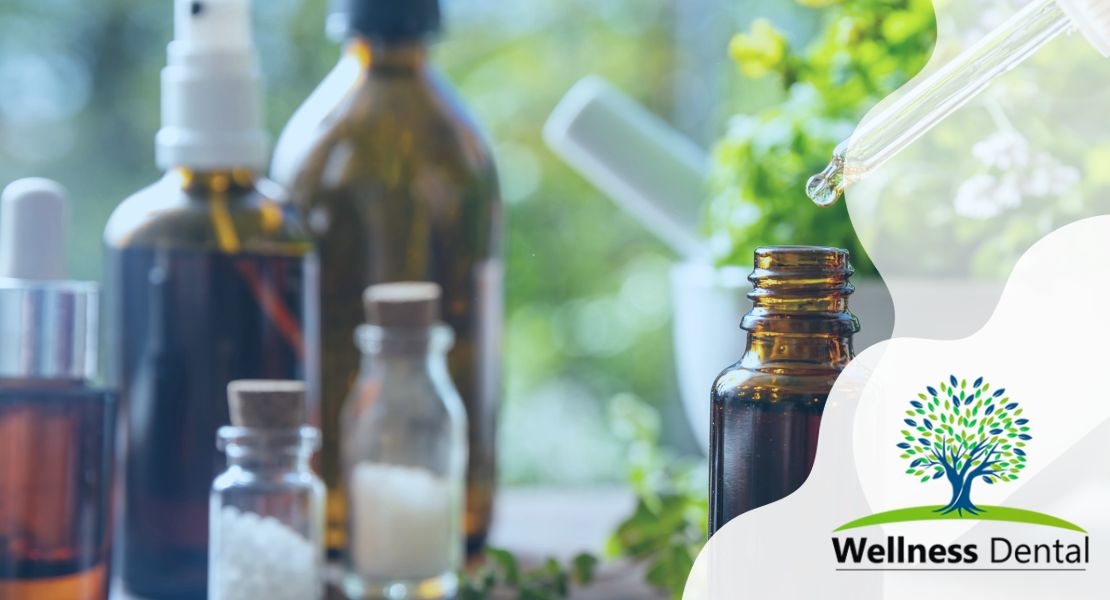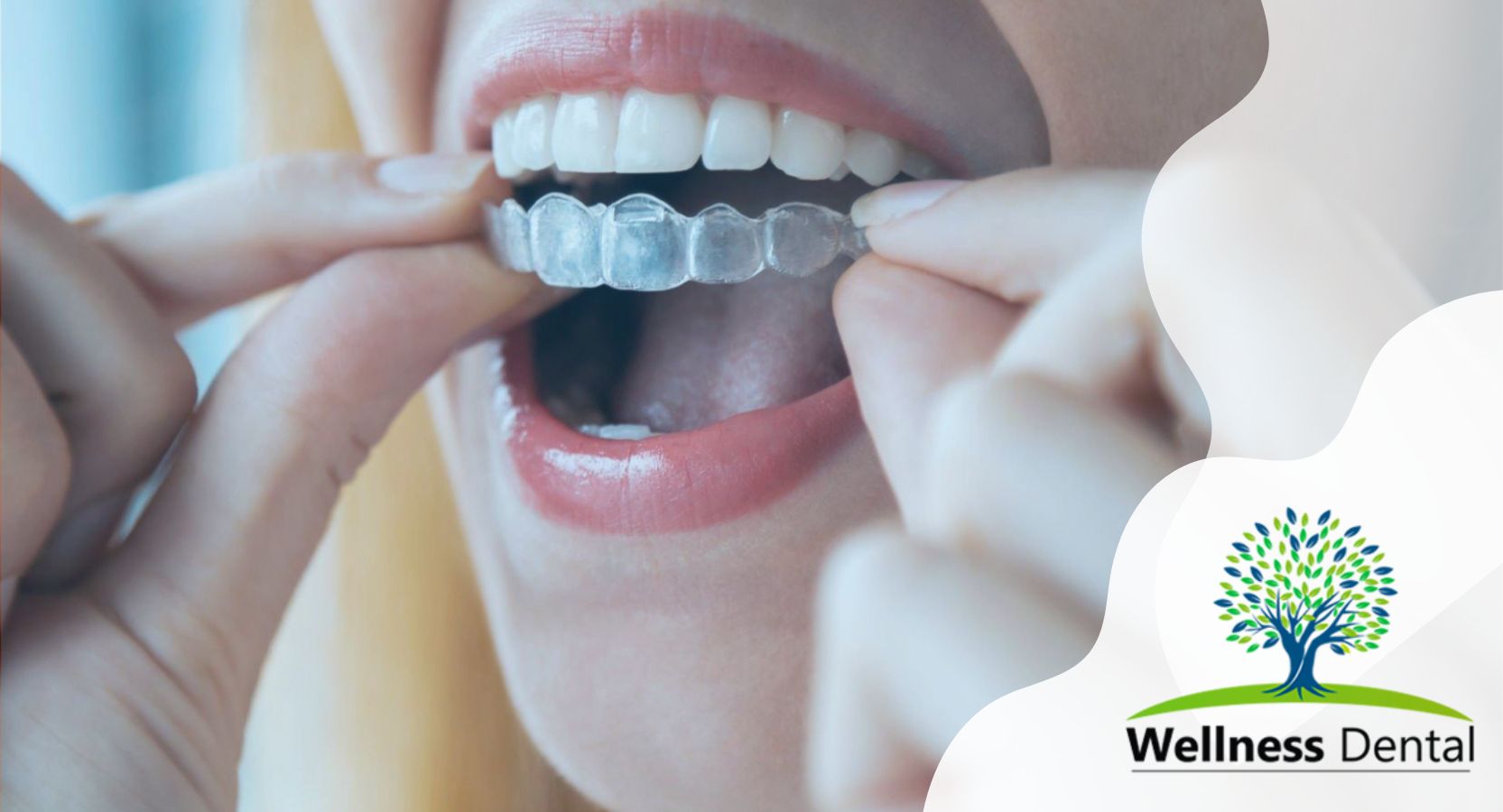1. Saltwater rinses: Mix warm water with 1 teaspoon of salt and swish around the mouth for 30 seconds before spitting it out. Saltwater rinses can help reduce gum inflammation and kill bacteria in the mouth.
2. Hydrogen peroxide: Mix 3% hydrogen peroxide with equal parts water and swish around the mouth for 30 seconds before spitting it out. Hydrogen peroxide can help kill bacteria and reduce gum inflammation.
3. Tea tree oil: Add a few drops of tea tree oil to a cup of warm water and use it as a mouthwash. Tea tree oil has antimicrobial properties that can help reduce bacteria in the mouth and alleviate gum inflammation.
4. Peppermint oil: Dilute a few drops of peppermint oil in a cup of water and use it as a mouth rinse. Peppermint oil has anti-inflammatory and antibacterial properties that can help reduce gum inflammation and bacteria.
5. Clove oil: Mix a few drops of clove oil with carrier oil and apply it to the affected gums. Clove oil has analgesic and antibacterial properties that can help reduce gum inflammation and pain.
6. Aloe vera: Apply a small amount of pure aloe vera gel to the affected gums. Aloe vera has anti-inflammatory properties that can help reduce gum inflammation and promote healing.
7. Baking soda: Mix a small amount of baking soda with water to form a paste and gently massage it onto the gums. Baking soda can help neutralize acids in the mouth and reduce bacteria.
8. Coconut oil pulling: Swish a tablespoon of coconut oil in the mouth for 15-20 minutes before spitting it out. Coconut oil has antimicrobial properties that can help reduce bacteria in the mouth.
9. Cranberry juice: Drink unsweetened cranberry juice, which contains compounds that can help prevent bacteria from sticking to the gums and reduce inflammation.
10. Sage mouthwash: Steep sage leaves in hot water for 10 minutes, strain the liquid, and then use it as a mouthwash. Sage has antimicrobial and anti-inflammatory properties that can help reduce gum inflammation and bacteria.
1. Clove Oil

Clove oil, derived from the clove plant, has been used for centuries for its various health benefits. It is known for its antimicrobial properties, which make it effective in fighting off bacteria and other microorganisms. This makes clove oil a popular choice for treating minor cuts, scrapes, and other skin irritations.
Furthermore, clove oil is known for its analgesic properties, making it an effective natural pain reliever. It can be used topically to alleviate toothaches, muscle pain, and headaches. Its anti-inflammatory properties also make it beneficial for reducing swelling and inflammation in the body.
In aromatherapy, clove oil is often used for its soothing effects. It can help alleviate stress, anxiety, and fatigue when used in a diffuser or through massage.
Clove oil is also widely used in dental care for its ability to reduce tooth pain and fight off oral bacteria. It is often used in toothpaste, mouthwash, and as a natural remedy for toothaches.
Overall, clove oil offers a range of benefits, from its antimicrobial and analgesic properties to its applications in aromatherapy and dental care. Its natural and versatile uses make it a popular choice for those seeking natural remedies for various health conditions.
2. Tea Tree Oil

Tea tree oil can be a beneficial and natural way to improve gum health and combat gum disease. Here are the steps for using tea tree oil in various ways for gum health:
- 1. Mixing with warm water: Add a few drops of tea tree oil to a cup of warm water and use it as a mouthwash. Swish it around the mouth for about 30 seconds and then spit it out. This can help reduce bacteria and inflammation in the gums.
- 2. Adding to toothpaste: Add a drop of tea tree oil to your toothpaste before brushing your teeth. This can help kill bacteria and reduce plaque on the teeth and gums.
- 3. Using as a mouthwash: You can also create a natural mouthwash by combining tea tree oil with water and a few drops of peppermint oil for a refreshing and antibacterial mouthwash.
- 4. Applying directly to the gums: For targeted treatment, you can apply a drop of tea tree oil directly to the gums and gently massage it in. This can help reduce inflammation and promote gum health.
Tea tree oil has potential benefits for treating gum disease due to its antibacterial, antifungal, and anti-inflammatory properties. It can help reduce inflammation and fight off harmful bacteria and fungi that can contribute to gum disease. Using tea tree oil as part of a regular oral hygiene routine can contribute to improved gum health and overall oral wellness.
3. Salt Water Rinse

To make a saltwater rinse at home, start by mixing 1 teaspoon of salt with 8 ounces of warm water. Stir the mixture until the salt is dissolved. Gargle and swish the saltwater in your mouth for about 30 seconds before spitting it out. Repeat this process 2-3 times a day, especially after meals and before bedtime, for best results.
Using a salt water rinse can effectively treat gingivitis and reduce gum inflammation and bacteria levels in the mouth. The salt helps to draw out infection and reduce inflammation, while also creating an environment where bacteria have a harder time surviving. Rinsing with salt water can soothe and heal irritated gums, making it a simple and effective homemade remedy for gum issues.
The benefits of using a saltwater rinse include its affordability and accessibility, as it can be easily made at home with common household ingredients. Additionally, salt water rinses are a natural and gentle way to alleviate gum discomfort and improve oral health without the use of harsh chemicals. By incorporating salt water rinse into your daily oral hygiene routine, you can effectively combat gingivitis and promote healthier gums.
4. Turmeric Paste

To make turmeric paste for treating gingivitis and toothache, simply mix 1 teaspoon of turmeric powder with water to form a paste. This paste can be swished around the mouth to provide relief for gingivitis, or it can be applied directly to the affected area for toothache relief.
Turmeric contains curcumin, which has strong anti-inflammatory and antibacterial properties. These properties make turmeric paste an effective natural remedy for reducing inflammation and killing harmful bacteria in the mouth, making it a great option for treating oral health issues such as gingivitis and toothache.
Using turmeric paste for oral health has many benefits, including its ability to provide relief for gum inflammation and pain, as well as its natural antibacterial properties that can help combat oral infections. Additionally, turmeric paste is a safe and natural alternative to commercial oral health products, making it a popular choice for those seeking natural remedies.
5. Lemongrass Mouthwash

Using lemongrass mouthwash offers several benefits in preventing and treating gingivitis. Lemongrass contains antimicrobial and anti-inflammatory properties that help in combating the bacteria that cause gingivitis and reducing gum inflammation. Additionally, its refreshing and citrusy scent leaves your mouth feeling clean and fresh.
To make an effective lemongrass oil mouthwash, you will need lemongrass essential oil, distilled water, and a small amount of alcohol, such as vodka, to help disperse the oil. Mix a few drops of lemongrass essential oil with water and alcohol in a clean bottle, and shake well before each use. Use this mouthwash twice a day after brushing your teeth for optimal oral health benefits.
Key properties of lemongrass that make it effective for oral health include its antibacterial, antifungal, and anti-inflammatory properties. These properties help fight off harmful bacteria, reducing inflammation, and promoting overall oral hygiene.
In summary, using lemongrass mouthwash can aid in preventing and treating gingivitis, thanks to its antimicrobial and anti-inflammatory properties. Making your lemongrass oil mouthwash is a simple and cost-effective way to incorporate this beneficial ingredient into your oral care routine.
6. Use hydrogen peroxide rinse.
To effectively treat gum inflammation and gingivitis at home, a hydrogen peroxide rinse can be used. The recommended ratio for the rinse is 1:1, meaning equal parts of hydrogen peroxide and water should be mixed. The swishing technique involves taking a small amount of the mixture into your mouth and swishing it around for 30 seconds to 1 minute. It is important to spit out the rinse and then rinse your mouth thoroughly with plain water.
It is suggested to use the hydrogen peroxide rinse twice a day, preferably in the morning and before bedtime. After using the rinse, it is advisable to wait at least 30 minutes before eating or drinking. Additionally, for more effective results, using a water flosser can help to remove plaque and debris from between the teeth and along the gumline.
Using a hydrogen peroxide rinse can help to reduce gum inflammation and gingivitis when used properly and consistently. However, it is important to consult with a dentist before starting any at-home treatment to ensure it is the right option for your specific dental needs.
7. Baking Soda Paste

To make an effective baking soda paste for oral health, start by mixing 1 teaspoon of baking soda with a small amount of warm water. Stir the mixture until it forms a smooth paste or liquid consistency. Then, gently apply the paste to your gums, using your finger or a soft toothbrush to rub it in for about 30 seconds. Alternatively, you can use the baking soda mixture as a mouth rinse by swishing it around in your mouth for the same amount of time. After either method, rinse your mouth thoroughly with warm salt water to remove any remaining baking soda residue.
Using a baking soda paste or mouth rinse can help promote oral health by reducing the bacteria in your mouth and providing a gentle cleaning for your gums. It can also help to neutralize acids in the mouth and reduce plaque buildup, which can contribute to gum disease and tooth decay. Incorporating baking soda into your oral care routine can be a simple and effective way to maintain a healthy mouth and gums.
8. Coconut Oil Pulling

Coconut oil pulling is an effective way to improve oral health and take advantage of the antimicrobial properties of fractionated coconut oil. To start, take 1-2 teaspoons of fractionated coconut oil and swish it around in your mouth for 20-30 minutes. Be careful not to let it touch the back of your throat during this time.
After the 20-30 minutes are up, spit out the oil and rinse your mouth with water. Following this, drink a full glass of water to help flush out any remaining oil, and then proceed to brush your teeth as usual.
Coconut oil pulling is a great way to support oral health and take advantage of the natural benefits of coconut oil. By incorporating this simple routine into your daily oral care, you can help reduce harmful bacteria in the mouth and promote overall dental health. Give it a try and experience the benefits of coconut oil pulling for yourself.
9. Aloe Vera Gel

Aloe vera gel has been used for centuries to treat a variety of conditions, including gum disease. Its antiseptic, anti-inflammatory, and antibacterial properties make it an effective natural remedy for relieving the symptoms of gum disease. Aloe vera gel can help reduce swelling, redness, and irritation in the gums, and it can also help fight off bacteria that cause gum disease.
To use aloe vera gel to treat gum disease, simply apply a small amount of 100% pure aloe vera gel directly to the affected gums. Gently massage the gel into the gums and leave it on for a few minutes before rinsing your mouth with water. For best results, this process can be repeated a few times a day.
When using aloe vera gel for gum disease, it’s important to ensure that the product is 100% pure and free from added ingredients that may irritate. While aloe vera is generally safe for most people, it’s possible to be allergic to it. Before using aloe vera gel on your gums, perform a patch test on a small area of skin to check for any allergic reactions.
In conclusion, aloe vera gel can be a beneficial natural treatment for gum disease due to its antiseptic, anti-inflammatory, and antibacterial properties. However, it’s essential to use pure aloe vera gel and be cautious of potential allergic reactions before use.
10. Vitamin C Supplements

There are several types of vitamin C supplements available on the market, including tablets, gummies, and powder forms. Each form offers a convenient way to get your daily dose of vitamin C.
The recommended daily dosage of vitamin C supplements for maintaining healthy gums and fighting off gingivitis is 65 to 90 milligrams per day for adults. For those with periodontal disease, the recommended dosage may be higher, up to 100-200 mg per day. It’s important to talk to a healthcare professional to determine the appropriate dosage for individual needs.
While vitamin C is generally safe, taking high doses can lead to potential side effects, such as diarrhea, nausea, and stomach cramps. In some cases, vitamin C supplements can interact with certain medications, such as chemotherapy drugs and blood thinners. It’s important to speak with a healthcare provider before starting a vitamin C supplement, especially if you are taking other medications.
In summary, vitamin C supplements are available in various forms and can be beneficial for maintaining healthy gums and fighting off gingivitis. However, it’s important to follow the recommended daily dosage and be aware of potential side effects and interactions with other medications.
Causes
Proper oral hygiene is essential in preventing the buildup of plaque and tartar, which can lead to gingivitis and periodontitis. Regular brushing, at least twice a day, helps to remove plaque and prevent tartar from forming. Flossing is also crucial, as it helps to remove food particles and plaque from between the teeth that the toothbrush can’t reach. Additionally, visiting the dentist for regular check-ups and cleanings is important to remove any plaque and tartar that has built up.
Untreated gingivitis and periodontitis can lead to serious consequences. Gingivitis can cause gums to become red, swollen, and bleed easily, while periodontitis can result in the loss of teeth and potential links to heart disease. It is important to recognize the signs of gum disease and seek treatment to prevent further damage.
Overall, maintaining good oral hygiene practices, such as regular brushing, flossing, and dental check-ups, is essential in preventing the buildup of plaque and tartar, and ultimately avoiding the risks and consequences of untreated gingivitis and periodontitis.
What is the average duration for treating gingivitis?
Gingivitis, the early stage of gum disease, can be effectively treated with a combination of good oral hygiene, home remedies, and professional dental care.
Good oral hygiene includes brushing your teeth at least twice a day, flossing daily, and using an antiseptic mouthwash to reduce plaque and inflammation. Home remedies such as saltwater rinses and oil pulling can also help reduce bacteria and inflammation in the gums. However, it’s important to note that these home remedies should complement, not replace, professional dental care.
Professional dental care for gingivitis may include a thorough dental cleaning to remove plaque and tartar buildup, as well as a recommendation for topical or systemic antibiotics to control infection. The timeframe for improvement in gingivitis can vary depending on the severity of the condition, but with proper treatment and consistent oral hygiene, improvements can be seen within a few weeks to a few months.
Regular dental checkups are crucial for monitoring the progression of gingivitis and ensuring proper treatment. It is recommended to visit the dentist at least twice a year for routine cleanings and checkups to maintain good oral hygiene and prevent the recurrence of gingivitis.
Ways to prevent the reoccurrence of gingivitis
Preventing gingivitis from returning requires strict adherence to proper dental hygiene practices. This includes daily flossing to remove plaque and food particles from between the teeth, using a therapeutic mouthwash to reduce plaque and fight bacteria, and brushing your teeth at least twice a day with fluoride toothpaste to remove plaque and prevent tartar buildup.
In addition to dental hygiene, maintaining a low-sugar diet can help prevent the growth of bacteria in the mouth that can lead to gingivitis. Avoiding or quitting smoking is crucial, as smoking can weaken the immune system and make it harder for the body to fight off gum infections.
Regular dental exams and cleanings are essential for preventing gingivitis from returning. Your dentist can detect early signs of gum disease and provide professional cleanings to remove plaque and tartar that cannot be removed through regular brushing and flossing.
By maintaining proper dental hygiene, following a low-sugar diet, quitting smoking, and scheduling regular dental exams and cleanings, you can significantly reduce the risk of gingivitis returning and maintain good oral health.







Thanks for the post, it was very helpful for me and my family.